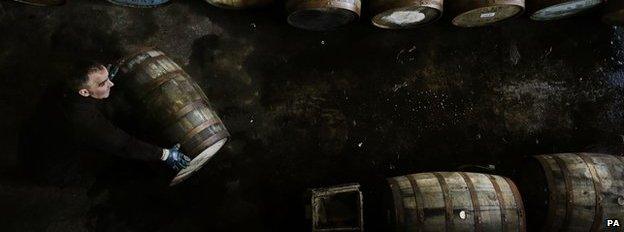Minimum alcohol pricing: Whisky producers fear 'trade war'
- Published

The Scotch Whisky Association believes the move could see retaliation in other markets
Whisky producers have said they fear a damaging trade war if a minimum price for alcohol in Scotland is approved by the European Commission.
Gavin Hewitt, chief executive of the Scotch Whisky Association (SWA), said there was "a really serious risk of a damaging precedent being set here which would be used against us in our overseas markets".
Mr Hewitt said he believed minimum pricing would damage Scotch whisky's competitors but that the industry had more to lose than to gain from that.
Drinks industry bodies criticise the proposed introduction of a minimum unit price for alcohol
Exports of Scotch whisky are worth £4.3bn annually, including £1.3bn to the European Union, according to the SWA.
"Don't deny that in fact it would remove competition," said Mr Hewitt, "but that is the whole point. We believe in free trade. We have spent the last 20 years removing protectionist trade barriers.
"If we introduce a distortion of trade here in the UK, albeit for public health reasons... watch what will happen in all our markets. They will then start using public health as a way to keep us out of those markets and I can give you examples of that already being talked about."
Not proven
Asked whether that would amount to a trade war, Mr Hewitt replied: "Yes... we'd be the sufferers and they would be looking after their own domestic interests."
The SWA has already lost a challenge to the legality of minimum pricing in the Court of Session but is appealing that judgment and expects the matter to end in the Supreme Court or the European Court of Justice.
Meanwhile, the Scottish government has asked the European Commission to grant it an exemption from free trade rules to enact the law, which was passed by MSPs in 2012.
The SWA is being supported in its action by spiritsEUROPE, a trade body representing producers across Europe.
Its director general, Paul Skehan, said his main objection to minimum pricing was that he had not seen evidence that it would work.
"We just don't think it's proven at all," he said.
But Mr Skehan said he was confident the policy would never be enacted.
"I'm not too sure we're terribly worried," he said. "Minimum unit pricing has been proposed many times over the last 30 years. Every time it's been proposed it's been put back by the European Court of Justice.
"At the moment it's going through the Scottish courts... ultimately it may end up in Luxembourg. If it does we're pretty sure it's going to be put down in the same way the other minimum unit pricing has been defeated."
'Colossal' binges
Mr Skehan suggested that the Scottish government should instead be more targeted in its approach to tackling alcohol abuse.
He said the problem was not about the amount of alcohol being consumed but the manner of consumption.
"The Nordic countries have some of the most restrictive legislation related to alcohol, they have some of the highest prices," Mr Skehan said. "And what you see is a low per capita consumption of alcohol but the way they drink alcohol is in colossal quantities in very short periods of time. And the index of health and hazardous problems that they have is huge.
"And yet Mediterranean countries drink more per capita but the way they drink is a much more measured slow spread-out effect and in fact what you don't have is any of the same hazards or harms."
Mr Hewitt agreed, saying that 30% of drinkers consume 80% of alcohol.
From the distilleries of Islay to the vineyards of the Mediterranean, producers of alcohol are watching carefully to see what happens next.
- Published25 July 2013
- Published25 July 2013
- Published25 July 2013
- Published25 July 2013
- Published3 May 2013